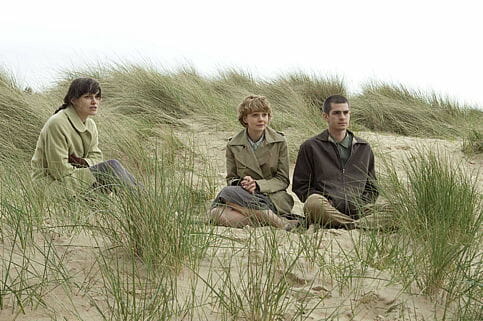By Peter Wertz · October 11, 2010

I’m overwhelmed. After a summer of crude, overly-budgeted nonsense, the last three weeks have found me in the theater watching films that were thoughtful, mature, and perhaps most resonantly, emotionally razing. I’ll say again: I’m overwhelmed. It’s exciting to arrive at this time of year as the mood starts to shift along with the caliber, but it’s also important to be prepared for it, and I can’t say that I have been. I’ve gone head first into these films with little more than excitement to safeguard me. Today, this trilogy of despair came to its logical conclusion with the lovingly crafted and deeply heartbreaking Never Let Me Go.
The film is based on Kazuo Ishiguro‘s 2005 novel of the same name, and follows Kathy (Carey Mulligan), Tommy (Andrew Garfield) and Ruth (Keira Knightley), three individuals cloned for the purposes of organ donation. As they brave their short lives in lamentable innocence, they must too deal with the complexities of a love triangle and the absence of so many things the rest of us take for granted. There is no real emphasis on becoming an adult, because it’s simply not something these donors will have to worry about. Their lives have been planned to the last detail by people they will never meet.
The story comes in three phases: youth at the Hailsham House boarding school, post-adolescence, and adulthood, which for our characters means the beginning of donations and moving toward “completion,” this world’s harmonious euphemism for death. While the first phase of the film feels a little numb, this is due more to the hesitant performances of Director Mark Romanek‘s child actors than anything else. Generally the story rides a line of exposition and elision, handling both fairly well. There’s a whole lot of story happening in the world at large, and conveying bits and pieces of it without too glaringly divulging everything is a feat Romanek mostly accomplishes. It’s once the film arrives at its second phase and into the hands of its wholly capable adult performers that we see its real strength. This young trio is strong, and Mulligan and Garfield together are phenomenal.
To appreciate what they’re doing, it’s important to appreciate the complexity of these characters. In a way, these three (and the many others stricken with the plight) are entirely unrelatable. It’s not just their inevitable demise and the special circumstances, but the characters utter lack of control and general resignation. While the rest of us would go kicking and screaming through this scenario, these three were born and bred to be forgiving victims. That’s not to say they don’t have moments of self pity, but these moments are so sparse and so quiet, you occasionally forget the horror of the truth. Kathy in particular has relinquished so entirely her anger, her frustration, her sense of the pure wrongness of this situation, she is somehow simultaneously immensely sad and magnificently strong. Garfield’s Tommy though is the truly pitiable character. His innocence is pure and while it lends itself to the notion of Tommy’s simplicity, his utter lack of offensiveness in any way makes him perhaps one of the most sympathetic and saddest characters you’ll ever witness. Further, the love these three have for each other, though occasionally romantic, is more often simply the kindred love of a family. The kind of undiluted love a person will never be rid of.
As much as death is the most universal conceit known to humanity, Never Let Me Go must be a universally affecting story. Death plays like a merciless, omnipresent villain or the deal-striking devil waiting to take his souls back. Once the film has made its grand reveal, death or “completion” become a part of everything. It all becomes a countdown and while there are no questions of “will it happen?” there is plenty of concern as to what our characters can accomplish before it does. Certainly we hope that they can love, but more than this we simply want their “completions” to feel complete. We want them, like us, to have the opportunity to not regret. Sadly, this seems altogether impossible given Kathy, Tommy and Ruth’s perpetual greenness. Paradoxically, their innocence is the thing that keeps them from admitting their innocence. To explain: it’s in that space just after childhood and before adulthood that we feel the most confident with our take on the world. It’s a flaw and a fluke, but every fresh teenager quite simply knows what’s right and what’s wrong, what’s true and what’s false. These characters may be dressed up in naivete, but their sense of duty gives them too a false sense, an undeserved sense of life lived, when in fact they haven’t really lived at all. This may just be a fact of life: we foist upon ourselves the idea of wisdom whether or not it exists so as to feel more like the adults we knew as children. With time this wisdom (hopefully) grows into itself, but sadly, maybe too sadly, the children in Never Let Me Go have that time taken from them.
Despite the film’s occasional jerkiness, despite it being a stripped down version of a story surely much grander, despite it feeling almost as though I was supposed to read the book before entering the theater, I wholly felt this film. I was stricken by Ruth and I cried for Tommy and I wanted so badly to offer something, anything to Kathy that might stay her gravity for just a short while. This marks success. This purely visceral response that defies completely any technical or narrative troubles. Yes, I want every film to be perfect. But they’re not. This one isn’t. What it is though is the sort of emotionally resonant experience you can’t shed for a long while after having it, and for Romanek and Co., that’s enough to call this a triumph.
3.5 out of 4 pitifully innocent, beautiful twenty-somethings that can actually act.